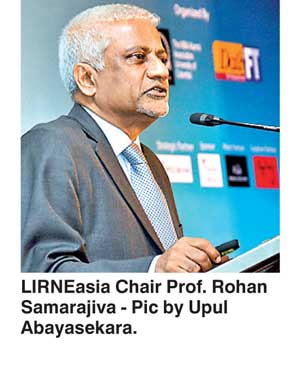Tuesday Feb 17, 2026
Tuesday Feb 17, 2026
Wednesday, 18 May 2016 00:42 - - {{hitsCtrl.values.hits}}
By Uditha Jayasinghe
Sri Lanka needs to tap into global value chains through sweeping reforms in human resources and State Owned Enterprises (SOEs) to foster strong growth at a point when the country’s demographic advantage is in decline, a tough talking expert said yesterday.
Former telecoms regulator and founding chair of LIRNEasia Professor Rohan Samarajiva delivering the keynote address at the Daily FT and Colombo MBA Alumni Association organised forum titled “Reforms: The Way forward for Sri Lanka” pointed out that Sri Lanka’s median age is at 31 years meaning “Sri Lanka is getting old before it gets rich.”
Trade agreements are a crucial facet of tying into global value chains and Sri Lanka should not risk becoming isolated in the global battle for stronger trade linkages he said, pointing out fresh deals inked by the Association of East Asian Nations and the Transpacific Partnership backed by the US, both of which Sri Lanka is not part of but its competitor Vietnam is.
“Trade agreements are something that this country needs. Detractors don’t understand that they are shooting themselves, shooting the next generation in the foot by objecting to Sri Lanka entering into what agreements we can enter into.”
However, the current economic crisis facing the country can be wrestled into producing positive results if policy makers are focused on key needs, he said pointing out how Indonesia used its financial problems to introduce reforms and spur growth. Timely reforms in the public sector, which employs nearly 2 million people, would create a labour pool for the private sector to draw from and create investment by stemming the haemorrhaging of public finance from State enterprises. Human resource reform would also encourage thousands of women to enter the formal workforce and balance out the overwhelmingly male labour component, he advocated.
“Crisis is important. Crisis should never go to waste. Other countries have dealt well with crisis. Indonesia implemented a slew of reforms in the 1990s and we could do the same. What I have to say, and I’m not in government so I don’t have to be politically correct, is that we need to open up to competition wherever possible. We have to remove barriers to entry, we have to where necessary have regulation. Privatisation is a dirty word in Sri Lanka but I’m going to use it here.”
Prof. Samarajiva demonstrated the massive losses of SriLankan Airlines as an example of public finance wastage and stressed how the cash ploughed into the national carrier could be used for sustainable development by increasing the funds available to social welfare programmes.
“The top five State Owned Enterprises made Rs. 605 billion in losses. This is 18% of Sri Lanka’s GDP and 81% of the current Budget deficit. Now we paid them money in order to accrue astronomical losses. We increased the number of people working at this airline by 30%. Currently we have 333 people per plane at SriLankan though there are airlines with just 76 people per plane. Pakistan leads South Asia as the highest number of employees per plane but we come a close second.”
“I believe that Samurdhi is an important infrastructure. I think that a country that does not look after its poor is not worth living in. In 2014 Sri Lanka spent double what it spent on Samurdhi just to cover the operational losses of SriLankan Airlines. What kind of priorities does our country have?”
Opening up loss making SOEs to private investment is just one step suggested by Prof. Samarajiva. Acknowledging that privatisation was fraught with political difficulties he also backed Government plans to establish a holding company for SOEs along the Temasek model as a “second best” solution but insisted it would have to come with stronger transparency and accountability mechanisms. Prof. Samarajiva called for a process where even the board of directors of the holding company can be held responsible for their performance and gave examples of how Singapore lists its State entities in the stock market to maximise company valuations and sustain growth.
“Failing privatisation the second best solution could be the Temasek model where commercial State enterprises are held under one holding company. I’m a bit worried about this because I have seen how the Temasek model was implemented in Bhutan and implemented badly. Just because something works in Singapore doesn’t mean it will work anywhere in the world because conditions can be different. Under this system only the purely commercial companies should be placed, where you have other social objectives don’t put them under Temasek.”